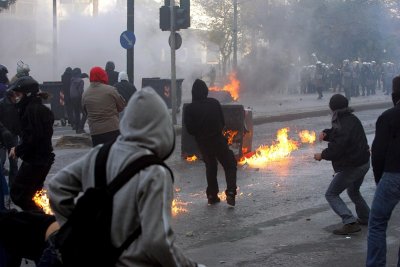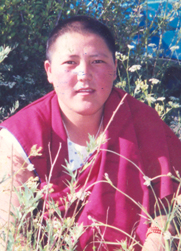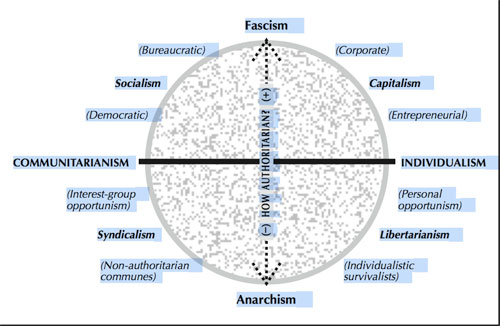Aleppo archbishop flees as Syria slips towards sectarian war
The Melkite Catholic archbishop of Aleppo flees Syria after his offices are sacked by jihadists—as the US State Department establishes an Istanbul office to aid the Syrian rebels.
The Melkite Catholic archbishop of Aleppo flees Syria after his offices are sacked by jihadists—as the US State Department establishes an Istanbul office to aid the Syrian rebels.
The British anarcho-syndicalist website Solidarity Federation runs a statement from a representative of a “group of young Syrian anarchists and anti-authoritarians from Aleppo.”
A jihadist attack on Pakistan’s Minhas Air Force Base coincides with a US Congressional report on threats to the “security” of Islamabad’s nuclear arsenal.
As urban warfare rages in Damascus and Aleppo, rebel gunmen abducted 47 Iranian pilgrims outside the capital—and a mob attack on Alawites was reported in Turkey.
Abu Bakr al-Baghdadi, top leader of al-Qaeda in Iraq and its affiliated Islamic State of Iraq, announced in an audio message July 22 a new plan to free imprisoned militants, attack the Iraq's judiciary and retake lost territory. "We are… Read moreAl-Qaeda in Iraq inaugurates new campaign of attacks

The US House of Representatives passed Joint Resolution 37, calling for the withdrawal of US armed forces from hostilities in the Republic of Yemen. The resolution states that only Congress has the authority to declare war, and notes that Congress has not made any declaration of war against the Houthi rebels in Yemen, who are the target of Saudi-led forces. US armed forces have supported Saudi Arabia through aerial targeting assistance, intelligence sharing, and mid-flight aerial refueling. The resolution gives President Trump 30 days to withdraw forces from hostilities in or affecting Yemen. Forces which are involved in operations directed at al-Qaeda in the region are exempt from the resolution. The resolution also does not restrict the sharing of intelligence. It also specifies that the resolution does not impact military operations undertaken in cooperation with Israel. (Photo via Jurist)

This book is a necessary corrective to the dominant perception—left, right and center—that the opposition in Syria are all jihadists and dictator Bashar Assad the best bet for "stability." Long a left-wing dissident in Assad's Syria, Saleh is a veteran of the dictator's prisons. Here, he traces the origins of the Syrian revolution to agony caused by the regime's "economic liberalization" (socialist phrases aside), describes the initially unarmed opposition's popular-democratic nature, and discusses the struggle to keep the Free Syrian Army accountable to this grassroots base after it became clear a military dimension to the revolution was necessary. He makes the case that the Assad regime can be termed "fascist" even by the most rigorous definition, and has been making good on its pledge to "burn the country" before ceding power. (Image: Haymarket Books)

As the Assad regime, backed by Russian air-strikes, opens its offensive on the Free Syrian Army's Southern Front in Daraa governorate—and towns start to fall to pro-regime forces, with thousands fleeing their homes in fear of reprisals—the White House has issued a statement to the rebels, warning, "[Y]ou should not base your decisions on the assumption or expectation of a military intervention by us." This despite Washington's earlier warning to Assad and Putin that any violation of the so-called “de-escalation zones” would have "serious repercussions." Not surprisingly, this betrayal comes just as Trump reportedly told Jordan's King Abdullah II at the White House that he is seeking a deal with Putin on terms for a withdrawal of remaining US forces from Syria. The US has long been constraining the rebel forces from fighting Assad as a condition of receiving aid, insisting they fight only ISIS and other jihadists. Now that ISIS is essentially defeated, we appear to be witnessing the betrayal of the Syrian opposition in a Trump-Putin carve-up deal. (Southern Front logo via Wikipedia)

Iraq's first parliamentary elections since the defeat of ISIS were supposed to herald a return of stability to the country after 15 years of practically incessant war. But turn-out was at a record low, and candidates were openly aligned with foreign powers playing for influence in Iraq. Incumbent Prime Minister Haidar al-Abadi, backed by the US, Saudi Arabia and Turkey, appears to be squeaking past more populist tickets seen to be in the sway of Iran. These include the coalition of vice president and former prime minister Nouri al-Maliki. The ruling Dawa Party split into rival coalitions as Abadi and Maliki fell out. But the surprise so far is the strong showing of Shi'iite cleric Moqtada al-Sadr in an unlikely alliance with the Iraqi Communist Party. Sadr played to resentment against the cronyism and corruption endemic to both factions of the Dawa Party. (Map: CIA)

Pakistan's army high command approved the death penalty for 10 condemned jihadists who were convicted by a military tribunal of attacks that claimed over 60 lives—including the assassination of Amjad Sabri, one of the country's most revered singers of qawwalii, traditional Sufi devotional music. Sabri was on his way to a televised Ramadan performance in Karachi when his car was attacked by gunmen, and his many followers hailed justice in the case. But in the two years since Sabri's death, attacks on Sufis in Pakistan have continued, with suicide blasts and horrific massacres at shrines and mosques. (Photo via PTI)